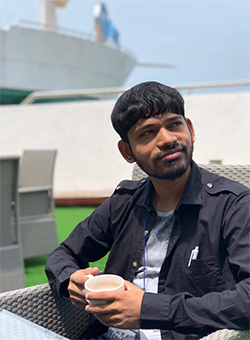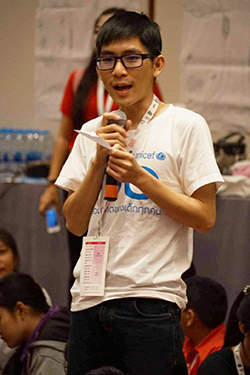Challenges for Young People Around HIV Disclosure
Stigma makes many people living with HIV (PLHIV) want to keep their diagnosis a secret. This is a particular challenge for young people who are going through transitions in their personal lives as they become independent adults, when disclosure could threaten their education and employment opportunities.

When Amit Mohite tested positive for HIV soon after being orphaned at age 7, he “entered a new world, a world of stigma and discrimination,” he wrote recently in Youth Ki Awaaz, a web platform for young people in India. Amit was repeatedly denied housing and schooling and was bullied because he is HIV positive. Despite these experiences, he decided to publicly disclose his HIV status, and is helping other young people living with HIV to think through whether to do the same. “I have no fear in disclosing my status anymore and I speak publicly to motivate other people like me,” said Amit in Youth Ki Awaaz. “My positive status is just a part of my identity—I am much more than that.”
Amit’s experiences with HIV stigma and discrimination are unfortunately similar to those of other young people across the Asia-Pacific. Despite the challenges, there can be individual benefits to disclosing one’s HIV status to others, including expanding the number of people who can provide emotional and social support in the context of HIV.
MikeQ, another young person who grew up with HIV, has also made his HIV status public. He now leads the Thai Network of Young People Living with HIV (TNY+). “By joining the existing network of young PLHIV, I receive more emotional support, which keeps me going,” he said. “But this is not only for myself, as the support helps in many other ways to strengthen our network.”

For young people who have grown up with HIV, the first step in the disclosure process is for them to learn about their own HIV infection. Although international guidelines recommend that disclosure take place around the age of 14, pediatricians in the TREAT Asia network have reported that disclosure in their clinics often happens at older ages, due to caregiver fears that children may not be developmentally ready.
A commonly reported concern is the risk of mental trauma upon learning both about their own HIV status and that of a parent(s) at the same time (in the case of mother-to-child transmission of HIV). In response, a group of Thai researchers conducted a study that showed disclosure to children was actually associated with having fewer symptoms of depression and an improved quality of life.1 Pediatric HIV care teams in the region currently use multiple methods to prepare caregivers for the disclosure process that involve individual counseling, educational sessions, and group discussions.2
Those who acquired HIV as adolescents or young adults initially face the challenge of disclosing their HIV status to family and friends, who are less likely to be aware of what it means to be living with HIV. And until there is a cure, the process of disclosure to others is one these young people will need to consider as they transition into and through adult life. “These are tough conversations for everyone involved,” says TREAT Asia director and pediatrician Dr. Annette Sohn. “But adolescents have the right to know about their own HIV status, and it is our responsibility as providers and advocates to help them cope with how an HIV diagnosis impacts their lives outside of the clinic.”
1For more information about this study, please see:
Boon-Yasidhi V, Naiwatanakul T, Chokephaibulkit K, Lolekha R, Leowsrisook P, Chotpitayasunond T, Wolfe M. Effect of HIV diagnosis disclosure on psychosocial outcomes in Thai children with perinatal HIV infection. Int J STD AIDS. 2016 Mar;27(4):288-95.
2 For more information about models of disclosure care, please see:
Jantarapakde J, Pancharoen C, Teeratakulpisarn S, Mathajittiphan P, Kriengsinyot R, Channgam T, Pengnonyang S, Plodgratok P, Lakhonphon S, Luesomboon W, Jadwattanakul T, Avihingsanon A, Ananworanich J, Ungaro P, Phanuphak P. An Integrated Approach to HIV Disclosure for HIV-Affected Families in Thailand. J Int Assoc Provid AIDS Care. 2019 Jan-Dec;18:2325958219831021; and
Arrivé E, Ayaya S, Davies MA, Chimbetete C, Edmonds A, Lelo P, Fong SM, Razali KA, Kouakou K, Duda SN, Leroy V, Vreeman RC; IeDEA Pediatric Working Group. Models of support for disclosure of HIV status to HIV-infected children and adolescents in resource-limited settings. J Int AIDS Soc. 2018 Jul;21(7):e25157.
Share This:
